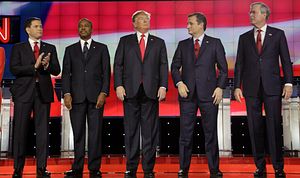To the average voter, the U.S. presidential campaign is a cacophony of claims, boasts, assertions and inaccuracies–virtually all of it focused on domestic issues. What is missing from the contenders still on the campaign trail is any informed discussion of the most important region of the world—the Asia-Pacific—and how their administrations would approach the region to promote U.S. interests.
The Asia-Pacific is not only the economic engine of the world, it increasingly appears headed for an unstable future—not only with the dictator in North Korea launching missiles and expanding his nuclear program, but China developing advanced weapons and militarizing artificial islands in the South China Sea. The region is home to complex challenges that are growing exponentially more threatening to the United States, its allies, and tens of thousands of U.S. military personnel stationed there.
China looms largest. From coercive maritime behavior in the East and South China Seas; excessive maritime claims with little basis in maritime law; expansive land reclamation activities; a robust military modernization program that includes anti-access, area-denial capabilities meant to limit U.S. freedom of movement; and mercantilist policies that feature intellectual property theft, China is acting as an aspiring regional hegemon with a 19th century, imperial mindset.
North Korea is a close second. With nuclear capabilities, a million man army, and an arsenal of mid- and long-range missiles, Pyongyang threatens the region and the United States. Further improvements in warhead and missile capabilities only makes things worse. And given the regime’s uncertain stability, an internal collapse could result in millions of North Koreans fleeing into China, South Korea, and possibly Japan, as well as a vacuum on the peninsula that could pull China and the U.S. into unwanted conflict.
These are the tip of the iceberg; the list goes on. Ongoing tensions between nuclear-armed India and Pakistan. The potential for a downturn in relations across the Taiwan Strait after its recent presidential election. The resurgence of Russia’s military in its Far East. Piracy threatening regional shipping lanes. Ongoing historical animosities. Proliferation of weapons of mass destruction. Effects of climate change and ecological degradation that could trigger mass migration of populations on low level coasts. Natural disasters in some of the world’s largest population centers.
Any of these challenges affect U.S. interests in the region, particularly its large economic stake, substantial forward presence, treaty commitments, and reliance on freedom of navigation. These will demand attention by the next U.S. president.
The candidates for that office should start talking now about their views of the region and how they would handle the challenges and the opportunities of the Asia-Pacific. To its credit, the Obama Administration recognized the importance of the region. Hence, its rebalance strategy, which, for the first time in America’s history, prioritized a region that was not Europe or the Middle East. Because no 2016 candidate has given any significant attention to the Asia-Pacific, it is uncertain whether the rebalance will continue. Both allies and potential challengers should not have to question U.S. commitment to the region.
The next U.S. president needs to provide his or her vision for a region that will impact America’s interests. At the same time, there needs to be recognition that America cannot go it alone. He or she needs to nurture the nation best positioned to assist the United States in achieving its interests. No other country fits this role better than Japan.
The next U.S. president will find a willing partner in Japan. Japan’s Prime Minister Shinzo Abe, in his April address to a joint session of Congress, summarized the importance of Japan to America when he said, “We will support the U.S. effort, first, last, and throughout.” Indeed, although America has five regional treaty allies, Japan is the lynchpin to U.S. engagement. It is home to the largest number of forward deployed U.S. troops, including a carrier battle group. Its own military is among the most advanced, and is increasingly able to support the United States on missions outside its own defense.
Diplomatically, Japan strongly advocates rule of law, works to strengthen the regional security architecture, and is one of the world’s top aid donors and climate change crusaders. And Japan joined the U.S. in the Trans-Pacific Partnership, promising to make this free trade agreement the largest of its kind in the world.
Japan matters for America and its long term interests like no other Asian-Pacific country. Period.
But you would not think so by listening to any of the U.S. presidential contenders. They can continue to focus their foreign policy visions on NATO allies and Middle East threats, but in doing so, expose their narrow views of both the challenges the U.S. will face in the coming years and the opportunities. The center of gravity of the world is shifting to the Asia-Pacific. The next U.S. president had better recognize this and leverage America’s relationship with Japan to ensure success.
Dr. Jeffrey W. Hornung is Fellow for the Security and Foreign Affairs Program at Sasakawa USA.

































